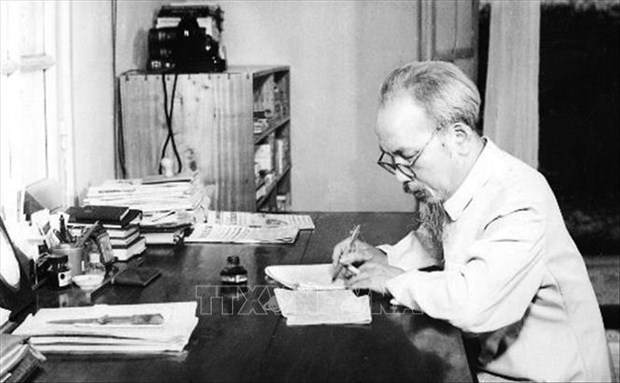 |
|
President Ho Chi Minh (File photo: VNA) |
At the event held at the bust of the late President in Caracas, PSUV Vice President Diosdado Cabello highlighted the Vietnamese leader’s contributions to the struggle for national independence, as well as the Vietnamese people’s strong sentiments for him.
Cabello also underlined the similarity in the struggles of people of the two nations against powerful forces, affirming that the indomitable spirit of the Vietnamese people serve as an example for Venezuela to protect the achievements of the Bolivarian Revolution.
Meanwhile, on his Twitter account, Venezuelan President Nicholas Maduro spoke highly of the patriotism and steadfastness of the Vietnamese people nurtured by the President Ho Chi Minh, which helped the country emerge victorious from past struggles.
The Venezuelan government on May 19 congratulated the Party, State and people of Vietnam on the birth anniversary of their great leader and one of the most prominent figures of the 20th century./.
US symposium features life, career of President Ho Chi Minh
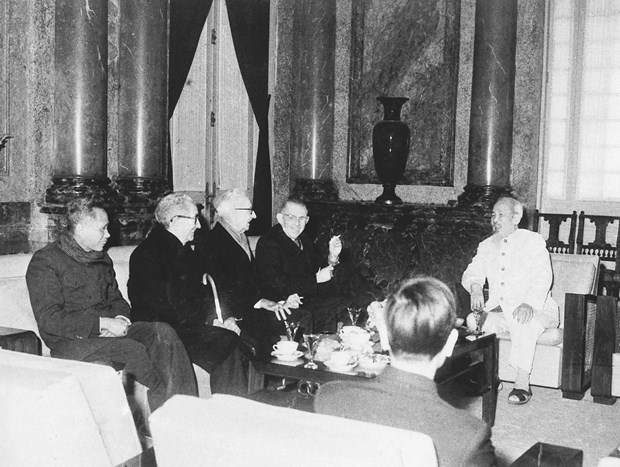 |
| President Ho Chi Minh (R) receives US intellectuals protesting the Vietnam war |
An online symposium on the life, thoughts and career of President Ho Chi Minh took place in New York on May 19 on the occasion of the late leader’s 130th birthday.
The event was co-organised by the Vietnam Mission to the United Nations, Vietnamese representative agencies in the US, and the associations of Vietnamese students in New York and Boston.
Speaking at the event, Ambassador Dang Dinh Quy, Permanent Representative of Vietnam to the UN, said President Ho Chi Minh left many invaluable legacies for later generations, with the largest one being his contribution to the struggle for national liberation.
After the country regained freedom and independence in 1945, a number of Vietnamese intellectuals worldwide decided to return to Vietnam to revive the country thanks to the late President’s great influence.
The second largest legacy is the President’s Thoughts in diverse areas, he said, adding that the late leader was aware of the role of other countries and respected them.
According to him, he was most impressed by the President’s forecasting ability.
President Ho Chi Minh attached importance to the power of great national and international unity, leading the country from success to success, he said.
The ambassador also shared documents and literary works on President Ho Chi Minh with Vietnamese students and answered their questions regarding the application of Ho Chi Minh’s Thoughts in Vietnam’s diplomatic orientations in the current context.
The same day, the Vietnamese Embassy in Laos held a meeting to celebrate the occasion.
The Vietnamese Embassy in Algeria and the Vietnamese Consulate General in Russia’s Vladivostok city also organized events to commemorate the late leader.
HCM City-Saint Petersburg video meeting marks Uncle Ho’s 130th birthday
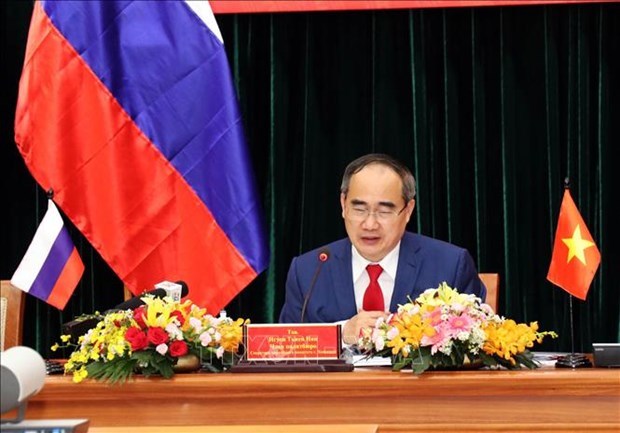 |
| Secretary of the HCM City Party Committee Nguyen Thien Nhan speaks at the event. |
A video meeting was held on May 19 by the Ho Chi Minh City Party Committee, Russia’s Saint Petersburg administration and the Embassy of Vietnam in Russia to mark President Ho Chi Minh’s 130th birthday (May 19).
The event also aimed to celebrate the 70th founding anniversary of diplomatic ties between the two countries.
In his opening remarks, Governor of Saint Petersburg Beglov Alexander recalled the visit of President Ho Chi Minh to Petrograd (Saint Petersburg today) in 1923, marking a new milestone in Vietnam’s struggle for independence. Events paying tribute to the Vietnamese national hero have been organised in the city on May 19 every year since 2018, he said.
He expressed his pride for Saint Petersburg to play a crucial part in the Vietnam-Russia relations that have been built on the long-standing friendship and mutual assistance, saying the ties between Saint Petersburg and HCM City are growing strongly in the fields of economy, education, tourism and youth cooperation.
Secretary of the HCM City Party Committee Nguyen Thien Nhan, for his part, said learning from Marxism-Leninism and October Revolution and with the help of the former Soviet Union (Russia today), Nguyen Ai Quoc, an alias of President Ho Chi Minh, had found the way to free Vietnamese people from the feudal regime and French colonists, win the resistance war against the US and reunite the country.
He affirmed that Vietnamese leaders and people always remembered Russia’s support for the country’s struggle for independence and national reconstruction.
Vietnam wants to lift the friendship and bilateral comprehensive strategic partnership with Russia to a new height, he said, adding that HCM City and its people will do their utmost to strengthen ties with Saint Petersburg to contribute to the two countries’ relations.
Vietnamese Ambassador to Russia Ngo Duc Manh and Russian Consul General in HCM City Aleksey Popov also delivered remarks highlighting the role of President Ho Chi Minh in nurturing the bilateral relationship as well as directions for the bilateral ties to expand further in the future./.
President Ho Chi Minh’s birthday celebrated in Ukraine, Germany
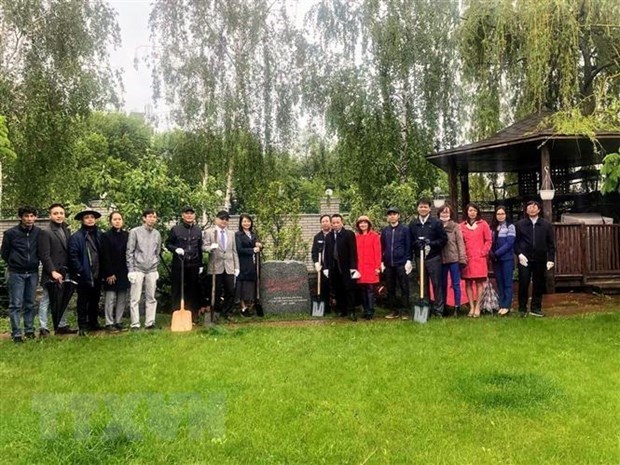 |
| At the tree-planting event |
Vietnamese agencies in Ukraine and Germany have held meaningful activities to mark President Ho Chi Minh’s 130th birthday (May 19, 1890-2020).
The Party Committee in Ukraine organized a tree-planting event at the Vietnamese Embassy in Ukraine on May 19.
Ambassador Nguyen Anh Tuan recalled that President Ho Chi Minh initiated a tree-planting movement which later has become a beautiful tradition of Vietnam. He affirmed that the President’s idea on planting tree – cultivating people has remained a valuable lesson.
Earlier, the embassy coordinated with the Ho Chi Minh School in Kiev to hold a seminar on President Ho Chi Minh and a contest on the life and career of the Vietnamese President.
The same day in Germany, the Vietnamese embassy held an incense offering ceremony to pay tribute to President Ho Chi Minh./.
International parties, friends offer congratulations on President Ho Chi Minh’s birthday
 |
| At a ceremony marking the 130th birthday of President Ho Chi Minh in Hanoi |
Many parties and friends in the world have sent messages of congratulations to the Communist Party of Vietnam Central Committee on the occasion of the 130th birthday of President Ho Chi Minh.
In its message, the Central Committee of the Lao People’s Revolutionary Party (LPRP) said the life and career of President Ho Chi Minh is associated with the revolutionary causes of the Vietnamese and Indochinese people, the international communist movement and the struggle for freedom and independence of oppressed nations around the world.
The LPRP Central Committee said President Ho Chi Minh had always provided valuable and timely support for Lao people during their national liberation cause, thus contributing to the success of the Lao revolution.
President Ho Chi Minh and Presidents of Laos Kaysone Phomvihane and Souphanuvong built the Laos – Vietnam ties into a powerful bloc of solidarity to defeat foreign invaders. Such special solidarity has become a pure, loyal and rare relationship in international relations, and a valuable asset of the two nations, and one of the factors deciding the victory of each country’s revolution.
The Party, State and people of Laos will preserve such everlasting ties together with the Party, State and people of Vietnam, the message said.
Meanwhile, the Central Committee of the Communist Party of Cuba (CPC) said President Fidel Castro Ruz and President Ho Chi Minh, leaders of two countries, nurtured their close-knit ties.
The CPC reaffirmed its determination to further consolidate the special friendship with the CPV, believing that President Ho Chi Minh’s teachings and testament will continue guiding the Vietnamese people and future generations in their socialism building cause./.
Ceremonies held to mark President Ho Chi Minh’s 130th birthday in Laos, Thailand
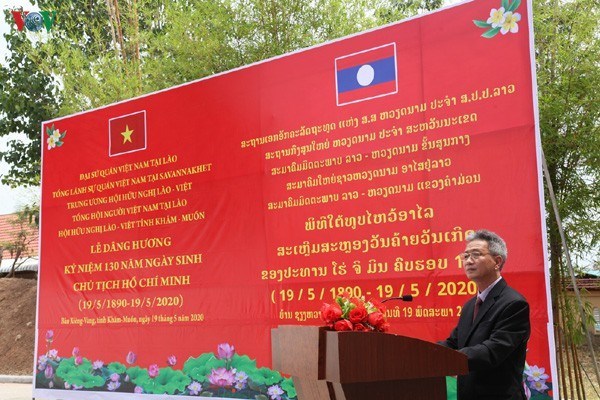 |
|
At the ceremony in Laos (Photo: VOV)
|
Ceremonies marking the 130th birthday of President Ho Chi Minh were held in Laos and Thailand on May 19.
At a memorial site dedicated to the late President in Xieng Vang village in the Lao province of Khammouane, the local community of overseas Vietnamese brought traditional Vietnamese cakes to put on the altar to remember the late President.
They were joined by delegates from the Vietnamese Consulate General in Savannakhet, the Laos - Vietnam Friendship Society, and the Vietnamese Association in Khammouane.
Delegates recalled major milestones in President Ho’s revolutionary life and memories of him crossing the Mekong River from the Thai province of Nakhone Phanom to Xieng Vang to set up a revolutionary base.
They expressed gratitude to the late President, who dedicated his life to the struggle for national independence and freedom in the two countries.
On the same day in Vientiane, Vietnamese Ambassador to Laos Nguyen Ba Hung hosted an incense-offering ceremony for the late President.
In the northeastern Thai province of Udon Thani, Vietnamese Consul General in Khon Kaen Hoang Ngoc Son and 100 overseas Vietnamese offered incense to President Ho Chi Minh at the Ho Chi Minh relic site. The site, the first of its kind in Thailand, was opened in 2006.
Speaking at the event, Chairman of the Vietnamese Association in Udon Thani Luong Xuan Hoa said that after arriving in the province, the President built a revolutionary movement and opened classrooms for the Vietnamese community during the 1928-1929 period.
Udon Thani is home to the largest community of Thais of Vietnamese origin in Thailand, with about 60,000 people./.
Documentary on President Ho Chi Minh aired on Venezuela’s national TV
 |
|
President Ho Chi Minh surrounded by children in 1960. (File photo)
|
A documentary on President Ho Chi Minh was aired on May 18 on Venezolana de Television (VTV), the state-run television station in Venezuela, to commemorate his 130th birthday (May 19).
“Ho Chi Minh – Chan dung mot con nguoi” (Ho Chi Minh: a Portray of a Man) by Vietnamese director Bui Dinh Hac was broadcast as part of the Latin American country’s activities to introduce the life and revolutionary career of the Vietnamese leader and national hero to its people.
The documentary tells stories about Vietnam’s struggle for national independence and portrays President Ho Chi Minh as a simple and devoted man who had great love for his nation and fought for its independence and freedom to the last breath.
Radio station Radio Nacional de Venezuela (RNV) has also aired a special show, featuring journalist Angel Miguel Bastidas who used to work in Vietnam for years, to talk about the late President and Vietnam’s revolutions in the past and national reconstruction and development today./.
Kazakhstani Ambassador: Ho Chi Minh’s Thoughts penetrate into Vietnam’s social life
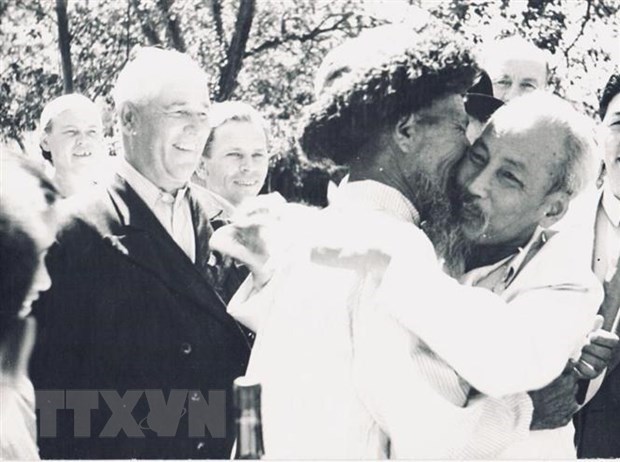 |
| President Ho Chi Minh (first from right) |
The Ambassador of Kazakhstan in Vietnam, Yerlan Bayzhanov has written an article sent to the Vietnam News Agency sharing his deep feelings about President Ho Chi Minh and the value of his political heritage.
In the article, written to mark the 130th birthday of the late President, the diplomat remarked that there is a commonality between Vietnam’s success in fighting COVID-19 and Ho Chi Minh’s Thoughts.
According to him, President Ho Chi Minh’s Thoughts have penetrated deeply into all aspects of Vietnamese social life. He added that all Vietnamese people exercised discipline and upheld a collective spirit, placing the common interest above personal benefit.
Apart from close collaboration between authorities, the Vietnamese people united, adapted to changes and stood determined to overcome difficulties. Such qualities were also strengthened by patriotism, he said.
Patriotism was a key characteristic of Ho Chi Minh’s ideology, Bayzhanov said, as Vietnam’s freedom and independence were priorities throughout his life and career. The late leader also placed the national interest above class views.
The Ambassador quoted Professor Vladimir Kolotov from the Far East History Department at Saint Petersburg National University in Russia as saying that Ho Chi Minh’s Thoughts are a system of viewpoints of the leader regarding the Vietnamese revolutionary process, including refined ideals from the French and American revolutions, Marxism-Leninism, and traditional philosophies in Far Eastern countries, which have been systemised based on Vietnam’s national culture.
The ambassador recalled that his father – a journalist - arrived in Vietnam in 1984 and 1987 and published a book entitled “Nation of Bravery”. He said he was strongly impressed by Ho Chi Minh’s modesty and simple life after visiting his house.
The Ambassador also said that Vietnam has built a consistent reform policy and market mechanisms to achieve political and economic stability with more welfare policies provided to the public.
Regarding Vietnam - Kazakhstan ties, he said the second President of Kazakhstan, Kassym-Zhomart Tokayev, attached great importance to ties with traditional friends.
Kazakhstan considers Vietnam an important partner in Southeast Asia, he said, adding that the two economies could be supplementary to each other.
He stressed that Kazakhstan understands Vietnam and believes that Ho Chi Minh’s Testament will be realized.
Russian, Indian scholars share feelings about President Ho Chi Minh
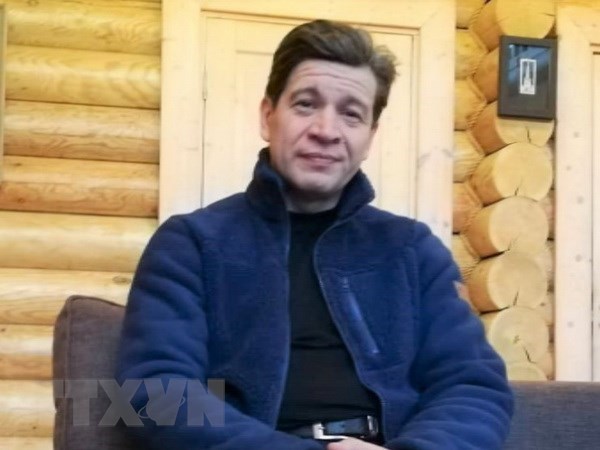 |
| Professor and Dr Vladimir Kolotov, head of the Ho Chi Minh Institute at the Saint Petersburg State University |
President Ho Chi Minh’s thoughts were built on a firm foundation of revolutionary ethics, Professor and Dr Vladimir Kolotov, head of the Ho Chi Minh Institute at the Saint Petersburg State University, told Vietnam News Agency correspondents in Russia on the occasion of the late President’s 130th birthday.
One of the leading Russian scholars in Vietnamese studies, Kolotov stressed that the President’s ethical values were solid based on the combination of both Western and Eastern philosophy.
President Ho always emphasised the just role of the Vietnamese people in the struggle for national liberation and reunification, he stated.
He highlighted the role and significance of morality and justice amid an unstable world, stressing the need to popularise President Ho’s thoughts, as the more the world relies on ethics, the better it will become.
President Ho Chi Minh, he went on, not only played an important role in Vietnam’s liberation and reunification but was also a renowned revolutionary who wrote books on revolutionary theory and practices in the late 1920s and early 1930s.
Kolotov also affirmed that President Ho always left a good impression on those he met.
Several Indian scholars also shared their opinions on President Ho.
Professor Jayachandra Reddy, head of the Centre for Southeast Asian and Pacific Studies at the Sri Venkateswara University and co-editor of the book “Ho Chi Minh with India”, affirmed that the whole world recognises that Ho Chi Minh is a legendary Vietnamese leader.
He admires President Ho, he explained, because of his leadership and unyielding fighting spirit for national liberation.
Sharing the same opinion, General Secretary of the India-Vietnam Solidarity Committee of West Bengal state Prava Samantaray said she is impressed by President Ho’s characters and lifestyle and has taken part in many seminars, programmes, and lectures on the late Vietnamese leader./.
Officials stress President Ho Chi Minh’s significant role in Lao revolution
 |
|
The Vietnam-Laos combatant alliance was established in 1950 under the impervious and clear-sighted leadership of the Indochinese Communist Party (File photo: VNA)
|
Had it not been for the leadership and guidance of President Ho Chi Minh, the revolution in Laos would not have been as successful as it was, according to Sounthone Sayachak, Chairwoman of the External Relations Commission of the Lao People’s Revolutionary Party (LPRP) Central Committee.
She made the comments during a recent interview with the Vietnam News Agency on the occasion of the 130th birthday of the late Vietnamese leader (May 19).
She noted that the Indochinese Communist Party, the predecessor of the Communist Party of Vietnam (CPV) and the LPRP, was established on February 3, 1930, by Ho Chi Minh, who was then known as Nguyen Ai Quoc. Since its foundation, the struggle for independence by the Vietnamese, Lao, and Cambodian peoples witnessed historic turning points and ended in glorious victories, leading to the independence of Vietnam on September 2, 1945, and of Laos on October 12 of the same year.
Under the impervious and clear-sighted leadership of the Indochinese Communist Party, the Vietnam-Laos combatant alliance was set up and, during the nine-year resistance war against the French colonialists, gained successive triumphs, in particular the historic victory of the Dien Bien Phu Campaign in May 1954 that forced the French to sign the Geneva Accords and recognise the independence of the three Indochinese countries.
The peoples of Laos, Vietnam, and Cambodia then continued to stand shoulder-to-shoulder in the fight against the US imperialists and won a resounding triumph in 1975, ending one of the fiercest wars in the history of humankind, according to Sounthone Sayachak.
She said the Lao Party, military, and people are well aware that the success of their revolution is inseparable from Vietnam’s revolution and attributable in part to the priceless and timely assistance from the CPV, President Ho Chi Minh, and the Vietnamese army and people.
It could be said that the success of the Lao revolution, the establishment and development of the LPRP, and the complete liberation of the Lao people and them following the path of socialism are due to the leadership and guidance of President Ho, the chairwoman noted.
Echoing this view, former Deputy Prime Minister of Laos Somsavat Lengsavath said that from the late 1940s onwards, President Ho Chi Minh shared Vietnam’s experience in building military resistance bases with Kaysone Phomvihane, who was later President of Laos, and this is why the late Lao leader chose Houaphanh province, which borders Vietnam, as the country’s revolutionary base.
President Ho Chi Minh also assigned General Vo Nguyen Giap to directly coordinate with Kaysone Phomvihane to help Laos develop its military. Thanks to President Ho’s sincere support and judicious recommendations, the Lao Issara (Lao Freedom) Army, now the Lao People’s Armed Forces, was established on January 20, 1949, and the Neo Lao Issara (Lao Freedom Front), now the Lao Front for National Construction, in 1950.
Somsavat Lengsavath said the Vietnamese leader’s recommendations were precise and suited the circumstances in Laos at the time, helping its revolution attain consecutive victories in national liberation and development.
Meanwhile, Kikeo Khaykhamphithoun, Secretary of the LPRP Central Committee and Minister of Information, Culture and Tourism, said President Ho Chi Minh was always a “close friend” of the Lao people and greatly contributed to the country’s revolution.
He quoted the late leader as saying that if the Lao revolution hadn’t succeeded and the colonialists hadn’t been driven out, the Vietnamese revolution and country would not have been able to survive.
The minister emphasised that President Ho Chi Minh held a crucial role in the revolution in Laos, adding that the Lao people always keep in mind his dedication and will continue to apply his advice in today’s development efforts, particularly the promotion of the special solidarity between the two countries./.VNA
 The Venezuelan Government held a ceremony to mark the 130th birthday of late President Ho Chi Minh on May 19, with the participation of officials of the ruling United Socialist Party of Venezuela (PSUV).
The Venezuelan Government held a ceremony to mark the 130th birthday of late President Ho Chi Minh on May 19, with the participation of officials of the ruling United Socialist Party of Venezuela (PSUV).